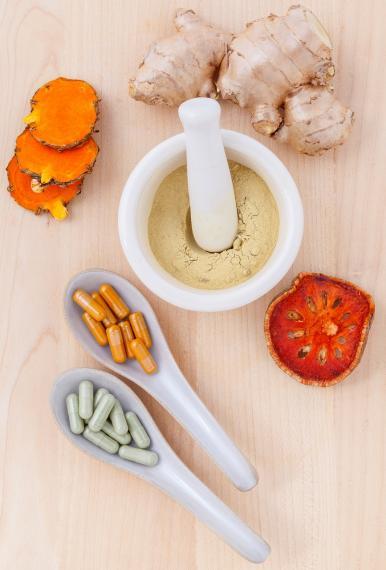
A lot has been written in recent months about possible adjunct therapies to prevent and treat the novel COVID-19 disease. The SARS-CoV-2 pandemic has initiated a surge of innovative research aiming to reduce the impact of COVID-19 through vaccine development, investigating the virus itself, and studying how specific compounds, like nutrients, impact the disease. Although no consensus exists as to how individual nutrients influence COVID-19, researchers can build on existing evidence of how nutrients impact other acute respiratory diseases. Among others, nutrients such as vitamin C, vitamin D, and zinc, are being explored in the prevention and treatment of COVID-19, as below.
Vitamin C
Vitamin C plays a role in tissue growth for protective barriers, pathogen destruction, and white blood cell movement to infected areas (Calder et al. 2020 [1]). Previous research carried out from 2018 to 2020 suggests that vitamin C infusion impacted different clinical outcomes in patients with severe acute respiratory failure and sepsis, with vitamin C decreasing mechanical ventilation time, decreasing time spent in the intensive care unit, and resulting in fewer deaths (Villines, 2020 [2]). Currently, a clinical study is examining the link between intravenous vitamin C and the number of days free from the hospital, ICU, using a ventilator, and the incidence of mortality in individuals with COVID-19 (Davis, 2020 [3]).
Vitamin D
Vitamin D has been in the news recently, with reports that patients were twice as likely to have a positive test result for COVID-19 if they had vitamin D deficiency (cut-off of < 20 ng/mL was used), compared to those with sufficient vitamin D levels (Morris, 2020 [4]). Vitamin D functions by modifying different immune system molecules through molecular binding activity and controlling production of some antimicrobial proteins (Calder et al. 2020 [1]). Researchers do not yet know whether or not vitamin D deficiency leads to serious COVID-19 symptoms, or if vitamin D deficiency is another risk factor for COVID-19. One research team in the United States is conducting a clinical trial to see if COVID-19-positive and vitamin-D-deficient patients who receive vitamin D supplementation experience improvements in their COVID-19 symptoms (Morris, 2020 [4]).
Zinc
Zinc’s role in the immune system involves cellular development and communication between immune cells (Calder et al. 2020 [1]). According to recent review (Skalny et al. 2020 [5]), there is existing research supporting that adequate zinc status and supplementation if needed, can suppress virus reproduction and possess antiviral activity for the family of viruses that contribute to acute respiratory diseases. However to date, there is no clinical evidence that zinc affects COVID-19. Many clinical trials are underway, one example is to determine if different combinations of vitamin C and zinc supplements can reduce the duration and severity of COVID-19 symptoms (Desai, 2020 [6]).
Maintaining a healthy diet and lifestyle is critical for healthy immune function, and vitamin C, vitamin D, and zinc play essential roles. Significant research efforts have mobilized to investigate these and other nutrients in the context of COVID-19, that may someday lead to evidence-based complementary therapies. It is exciting to follow the research that is emerging in this area, be sure to check back for more updates.
References:
Calder, P. C., Carr, A. C., Gombart, A. F., & Eggersdorder, M. (2020). Optimal nutritional status for a well-functioning immune system is an important factor to protect against viral infections. Nutrients, 12, 1181. https://doi.org/10.3390/nu12041181 [1]
Davis, B. (2020). Administration of Intravenous Vitamin C in Novel Coronavirus Infection (COVID-19) and Decreased Oxygenation (AVoCaDO) [Data set]. ClinicalTrials.gov. https://clinicaltrials.gov/ct2/show/NCT04357782?term=Administration+of+Intravenous+Vitamin+C+in+Novel+Coronavirus+Infection+%28COVID-19%29&draw=2&rank=1 [3]
Desai, M. Coronavirus 2019 (COVID-19)- Using Ascorbic Acid and Zinc Supplementation (COVIDAtoZ) [Data set]. ClinicalTrials.gov. https://clinicaltrials.gov/ct2/show/NCT04342728?recrs=adf&intr=%22Vitamin+C%22&draw=4 [6]
Morris, A. (2020, July 22). Researchers investigating possible link between vitamin D deficiency and COVID-19. Retrieved 2020, July 29, from https://www.azcentral.com/story/news/local/arizona-science/2020/07/22/coronavirus-research-study-link-between-vitamin-d-deficiency-covid-19/5445070002/ [4]
Skalny, A.V., Rink, L., Ajsuvakova, O.P., Aschner, M., Grisenko, V.A., et al. (2020). Zinc and respiratory tract infections: Perspectives for COVID-19 (Review). International Journal of Molecular Medicine, 46(1): 17-26. https://doi.org/10.3892/ijmm.2020.4575 [5]
Villines, Z. (2020, June 8). Can vitamin C prevent or treat COVID-19?. Retrieved 2020, July 29, from https://www.medicalnewstoday.com/articles/can-vitamin-c-prevent-or-treat-covid-19 [2]
